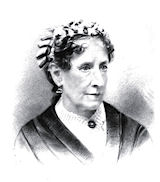Headquarters Delaware Department,
Wilmington, Del., July 10th, 1863.
My dear Mother:
I know I ought to be thankful in my present pleasant position, but somehow or other I was not born to enjoy sinecures. Doing nothing makes me very fretful. I had a capital good time while on Maryland Heights, feeling well repaid for my trip thither, but after leaving, I have been bored to death with the ennui of city soldiering. To be sure we are feted, and take our places among the Princes of Delaware, still, my dear mother, it was not for this I left home, and I cannot, with all the idle time on my hands, avoid regretting the pleasant summer plans we had arranged in old Conn. It is six years since I have strolled about the streets of Norwich the whole summer long. Norwich was never more beautiful than now. So I suppose I feel disappointed at being so peacefully employed at the seat of war. Still here we are, General and Staff—persons of distinction—Ahem! I am on hand in case I am called for. I don’t owe my position to Gov. Buckingham, and I expect to get home to my studies in the fall. Good things, all of them! Besides this, I am raising whiskers. I am reading Kinglake’s “Crimea.” I have given up smoking. Think of that! You see, at first, when I found there was little to do, I smoked vigorously to pass away time. But when the cigar was smoked, there was an end to the amusement, so I then determined to break off smoking altogether, and, to make it exciting, I kept a handful of cigars in my pocket so that the temptation might be frequently incurred. Whenever I longed for a fragrant Havana, I would take one in fingers, and then sitting back in my chair, reason philosophically on the pernicious effects of tobacco. On reaching the point of conviction, I would return it to my pocket unlighted. This, you see, has afforded me a very excellent pastime.
Occasionally Bishop Lee’s benignant face shines upon us. Everyone worships the Bishop here, and how he deserves it, you know well.
Am very sorry for Capt. Nichols. The opposition is a mistake. However, I should as soon think of breaking my heart for a Bedlamite Hag, as for one who rejected me on the grounds of prudence. So perhaps Nichols is not so unlucky as he thinks himself. Now that I have practically abandoned military life, I have a fancy Gov. Buckingham made a mistake in persistently ignoring my claims to promotion. I fancy I would have done him more credit than some of his appointments. This may be vanity.
Written in haste
with affectionate intent,
W. T. Lusk.



